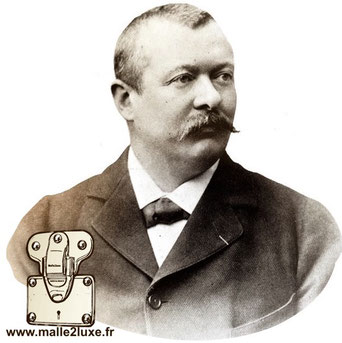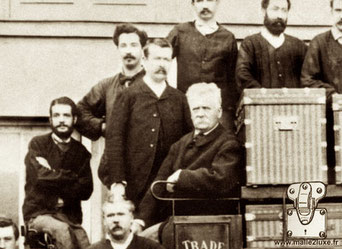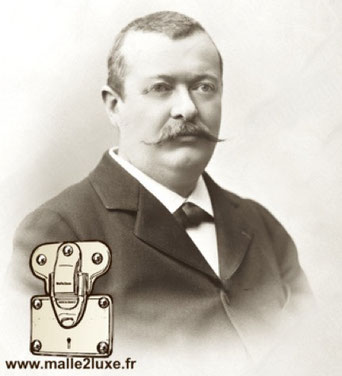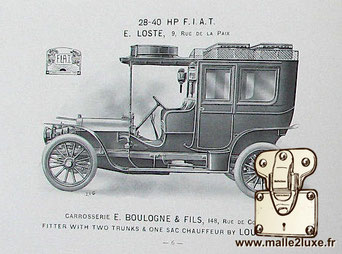- Accueil
- Louis Vuitton
- Modeles
- Toiles
- Serrures
- Lozines
- Etiquettes
- Séries
- Expertise
- Prix du neuf
- Record enchère
- Stars LV
- Contrefaçon
- Nouveauté 2025
- Vanity
- Valise
- Cabine
- Courrier
- Wardrobe
- Automobile
- Fourrure
- Chaussures
- Ideale
- Aluminium
- Explorateur
- Malle à fleurs
- Cadeau VIP
- Jouets
- Chapeau
- Leopold Stokowski
- Albert Kahn
- Tableau
- Lit
- Tiroirs
- Bibliotheque
- Aéro
- Cigare
- Pique-nique
- Alcool
- Pêche
- Marmotte
- Steamer Bag
- Vermeer
- Vendôme
- Georges Vuitton
- Gaston Vuitton
- Homme cible
- Sac petite malle
- Goyard
- Moynat
- Hermès
- Malle ancienne
- Entretenir sa malle
- Estimation
- Lexique
- Décoration
- Personnalisation
- Etiquette Hotel
- Blog
- Louis Vuitton
- Contact
- Ateliers
- Tutoriel : Fabriquer sa malle
- Boutique
GEORGES FERRÉOL VUITTON (1857 - 1936)

Name: Georges Ferréol Vuitton
Nationality : French
Father : Louis Vuitton
Mother : Clemence Emilie Parriaux
Children : Marie Louise, Gaston Louis, Jean, Pierre, Marcel Vuitton
Wife : Joséphine Patrelle (1863-1964), daughter of the founder of Arôme Patrelle.
If Louis Vuitton built the first stones of the building of the Louis Vuitton company , it is indeed his son Georges, the second generation, who innovated, today made these trunks legendary. He thus created the first modern luxury brand, sophisticated items for travel enthusiasts, a global icon. Georges, in the footsteps of his father, craftsman turned entrepreneur, invented a new code on how to live a luxury experience and make his brand exclusive.

Georges was an excellent businessman ! Audacious, which has made the family business a global phenomenon and increased the reputation of the House internationally. He implemented many of the best practices that we consider to be standards for luxury brands today.
But the exclusive experience is not all the success of Maison Louis-Vuitton, the secret of this success also lies in the quality of new creations and constantly renewed innovations. We will try to list you in this article his career but also his creations, the most memorable of which will remain the Monogram canvas.
Born July 13, 1857 in Asnières sur Seine , Georges Ferréol Vuitton is the only son of Louis Vuitton and Clémence-Emile Vuitton.

In 1871 Louis wanted to tackle the international market. He is already 50 years old and cannot do it alone. Preparing Georges to take over, he decides to give him an Anglo-Saxon education . Georges will study for two years in England in Jerseyin a boarding school. His whole life will be marked by this education.
In 1873 Georges began an apprenticeship in Asnières-sur-Seine. As his father is called by the employees " Monsieur Louis ", he will be called " Monsieur Georges". Without great talent in the workshop, George takes the commercial direction, so that his father devotes himself fully to the workshop of Asnières sur Seine for the making of new models of trunk.
In 1875 George was called up to the army and joined his regiment in Orléans. He would come back a year later.

In 1880 Georges married Joséphine Patrelle. Louis Vuitton sells the company to his son, but remains active until his death.
In 1885 , Georges opened his first boutique outside of France, in London on Oxford Street. Its objective: to make the brand known on the international scene.

1888 the checkered canvas. This canvas is the starting point for the stenciled canvases, light , aesthetic and robust, it covers the trunks of the Maison de Luxe. Louis and Georges decide to thwart the first counterfeits by adopting this new canvas with the inscription "L.Vuitton Trademark of registered trade".

1889 the patented multigorge lock, with a legendary design . It offers a double advantage. A unique design, still used today on new Louis Vuitton trunks. In addition to its aesthetics recognizable by all , the very robust design, is a real asset to protect the contents of burglars, many at that time. But in addition to being tamper-proof, it offers the possibility of creating as many unique keys asthere are clients. Thus, customers are registered with their unique key number. Key that will be remanufactured in the event of loss, and who opens all of his client's trunks. He is the only trunk maker who had the idea of having locks of such complexity. This service was at the time a real innovation.

1892 , death of Louis Vuitton. Georges has to assume sole responsibility for the management of the family business.
1893 , just a year after the death of his father, Georges travels to the United States for the World's Columbian Exposition in Chicago. The goal is always to conquer the world.

1896 the Monogram canvas . In response to counterfeiters who copy the checkered canvas, but also in tribute to his father who died 4 years earlier. George unknowingly invents the canvas that will make the success of the house making it recognizable in the 4 corners of the planet, it is the first time that a designer has placed his brand so prominently on his product. The motif is a repetition of geometric flowers accompanied by the letters LV, the design of which is legendary today. Initially the canvas is made of linen woven at the Jaquard looms then glued to the trunks using a mixture of dextrin and rye flour. The canvas will be patented in 1905.

1897 the first prototypes of automobile trunk are presented at trade shows. Georges Vuitton's innovation is to offer travelers the ability to take to the road with a car capable of carrying the same quantity of cargo as one could embark on a boat or a train. He has created trunks sealed in rain and dust, covered with a sturdy canvas fabric called Vuittonite, the same color as the car body, mostly black. These trunks were made to measurein order to adapt to the body of the vehicle. The locks of these trunks are the result of his research and patent of 1888. The mechanism is simplified and a dust cover is added to meet these new constraints.

1901 Steamer bag under the name of the inviolable (" which protects your privacy "), it is an extra bag, originally an essential on-board bag for travelers going on cruises.
1901 Book: Le Voyage - from the most ancient times to the present day . Georges wrote the first travel book published by Louis-Vuitton. So he started what is now a big part of Monogram House marketing : travel books.

1905 invention of the ideal trunk, a true male wardrobe, it was named "Perfect" then "ideal". This is to say the absolute of its concept.
In 1908 Georges Vuitton officially proposed a project for an unsinkable trunk, the Aero trunk, to support the creation of helicopter prototypes by his twin sons Jean and Pierre.

1910 - VIP gift, the flower trunks will make the brand even more exclusive. Receiving these gifts was considered an honor, as they were exclusive and could not be purchased. Even today, VIP gifts are part of the commercial strategy of the Luxury House.

1914 - The largest travel goods store in the world is inaugurated by Georges Vuitton at 70 Champs-Élysées, This avenue which will become the historic promenade which houses the Arc de Triomphe.
On October 26, 1936 , Georges Ferréol Vuitton died at the age of 79 in Asnières-sur-Seine. His wife, Joséphine Vuitton (née Patrelle) survived him for many years, she died much later in 1964 in France. Gaston, the eldest of their sons, taking over when his father died in 1936.

Tribute to a genius of commerce , which has defined a true strat egy luxury.
Like the products created by the brand, Georges Vuitton has played an essential role in developing a sustainable mindset around the luxury strategy. He developed a new philosophy which would later be formalized in business schools as a luxury pricing strategy . A standard set by the Louis Vuitton brand and still followed by luxury brands today, never cut prices or offer discounts, never lower quality but rather raise prices as demand increases .
Georges Vuitton : French page
Copyright © 2008-2025 Malle2luxe Paris. Tous droits réservés.

